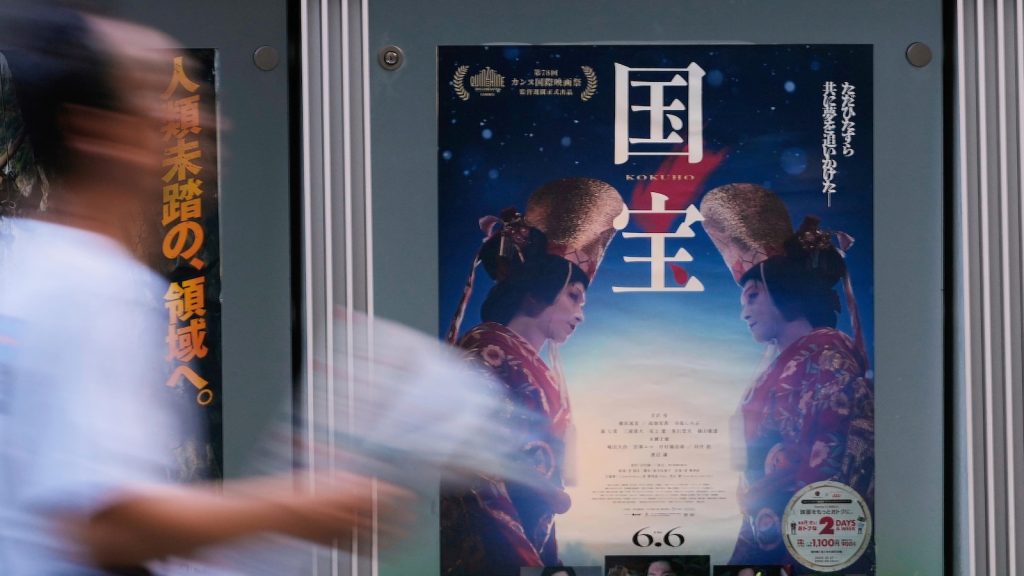TOKYO — A three-hour film about the esoteric world of Kabuki is defying the odds at the Japanese box office, with tickets selling out at some cinemas.
“Kokuho,” which means “national treasure,” has already grossed more than 10 billion yen ($68 million), making it the second-highest grossing Japanese live-action film of all time, and the first to achieve that in more than two decades.
It stars heartthrobs Ryo Yoshizawa and Ryusei Yokohama who portray longtime rivals and soulmates. They are both Kabuki “onnagata” actors, meaning they specialize in women roles, from gorgeous princesses to damsels in distress.
They look stunning, and convincing, having gone through months of training with a real Kabuki actor.
Japan has submitted the film for the international feature category at the Academy Awards. The short list of the 15 films from which the final nominations come will be announced Dec. 16.
“Kohuko” got a favorable reception at the Cannes Film Festival. And it’s been seen 7.4 million times in the first 73 days in Japanese theaters, many of them repeat viewers.
The plot of “Kokuho” — pronounced Koh-koo-hoe — explores perennial themes of family and the grueling hardships of being an artist, set to the backdrop of the intense but dreamlike life of the Kabuki actor.
It also pays homage to old-style yakuza movies, as well as obliquely to Western gangster films, like “The Godfather,” because one of the heroes is the son of a gangster.
In short, it’s not the kind of material that usually makes a hit movie in Japan, where action-packed blockbusters or animation based on popular manga comics or spectacular special effects have drawn audiences in the past.
But the movie’s theme explores something intrinsically Japanese and hit a raw nerve in a country where soul-searching about national pride is on the rise amid a widespread perception that economic and political clout is on the decline.
Being an outsider was the theme that jumped out for tourism science scholar Yosuke Kon.
“The Kabuki world seems very special, but a Kabuki kind of mentality exists in many places in Japan,” he told The Associated Press, noting a closed mentality is prevalent in the village, as well as local governments he has worked with.
“Many people can relate to the film,” he added.
The film is dominated by stage scenes from Kabuki, an art form dating to the 17th century, which combines stylized dance and acting to live music. It’s been stereotyped as catering to old people, as younger generations turn to Western and modern forms of entertainment like boys’ bands, baseball games and streaming services.
In Kabuki, all the roles are played by men, wearing thick makeup and elaborate kimono, delivering sing-song lines in tales of intrigue and violence set in the samurai era.
The film shows the dazzling esoteric elements of Kabuki, such as the backstage where actors apply makeup with their fingertips, or the flutter of paper snowflakes or flower petals on the stage.
It also reenacts the biggest hits of Kabuki — “Musume Dojoji,” in which a vengeful love turns a woman into a serpent, and “Sagi Musume,” whereby a heron dances taking the form of woman, a sort of Kabukiesque “Swan Lake.”
As with many younger Japanese, Sara Akino, a singer, hardly ever goes to the movies, but she was glad she went.
“It’s about living so true to yourself you are putting your life on the line,” she said.
People’s reactions varied, with everyone seeming to get something slightly different out of it.
“The beauty of the cinematography was utterly amazing,” said Miho Anzai, a nutritionist, who saw the film after hearing so much about it. She was especially impressed with the younger actors who portrayed the characters as children.
“The work was superb in how realistically Kabuki actors and their fiercely strict yet delicate aesthetic were portrayed,” she said.
Hiroyuki Okada, a teacher in the traditional “ikebana” flower arrangement, said the film gave him a sense of satisfaction as though he had seen high quality theater, and that the characters seemed to represent light and darkness, or the Asian duality of “yin and yang.”
“I felt the work depicted a tasteful pursuit of madness,” he said.
The success of the film has sparked interest in the two-volume best-selling book by Shuichi Yoshida it is based on. Yoshida worked as a stagehand for several years to learn the workings of Kabuki.
The film has been brought to the screen by acclaimed director Sang-il Lee, whose credits include the 2007 award-winning film “Hula Girls” and the 2022 Apple TV series “Pachinko,” as well as the Japanese-language version of Clint Eastwood’s “Unforgiven.”
Cinematographer Sofian El Fani, a Tunisian who worked on the Palme d’Or-winning “Blue is the Warmest Color,” presents mesmerizing closeups that highlight the inner turmoil of the characters. His camera angles give a delightfully new and pensive perspective on Kabuki, whose official footage tends to make a point of showing full-body shots.
Lee was deeply moved to see people watching his film, glued to the screen. The scene was straight out of the movies, he recalled
“There the barriers of generations were gone, living proof that everyone is searching for the moment that truly touches our emotions, knowing how beautiful those tears that flow for no reason can be,” he said in a statement. “Films are so wonderful. They are worth the fight.”
___
Yuri Kageyama is on Threads: https://www.threads.com/@yurikageyama


